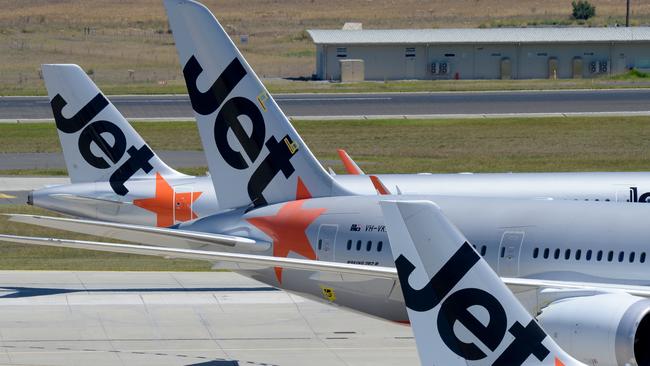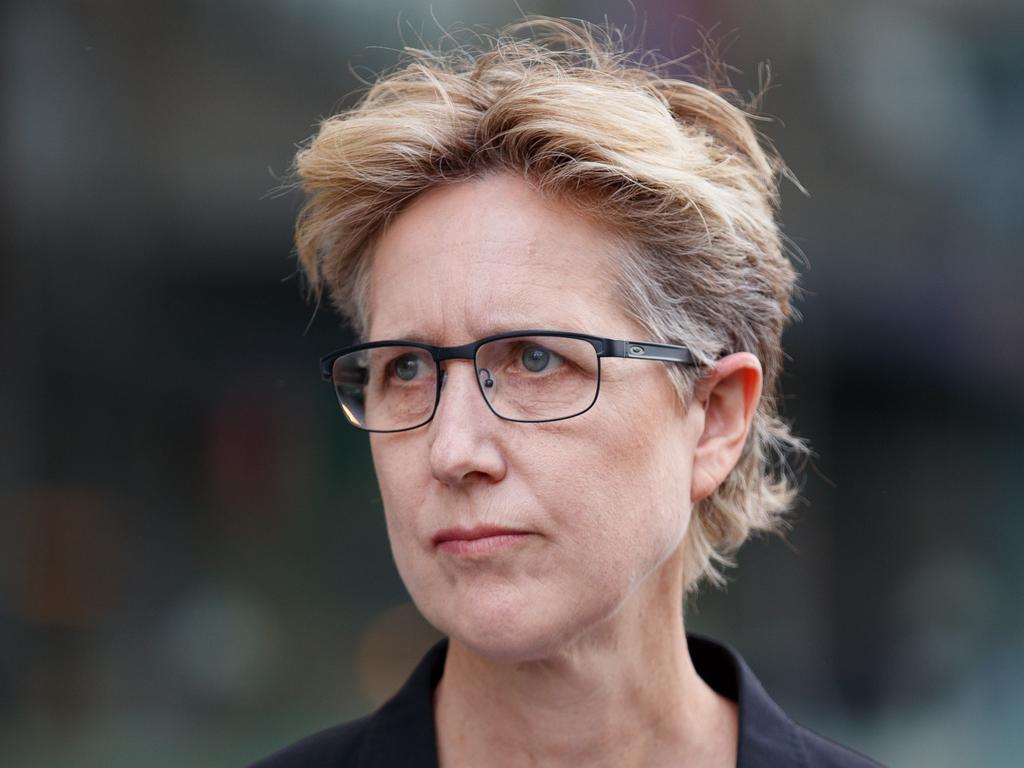Jetstar workers win $7000 ’same job, same pay’ wage rise
Almost 1500 low-paid Jetstar cabin crew will receive a $7000 a year pay rise after the Transport Workers Union struck an deal with the Qantas subsidiary.

Almost 1500 low-paid Jetstar cabin crew will receive a $7000 a year pay rise after the Transport Workers Union used Labor’s same job, same pay laws to strike a landmark in-principle agreement with the Qantas subsidiary.
As big business called for Labor’s multi-employer bargaining laws to be scrapped or apply only with employer consent, TWU national secretary Michael Kaine revealed the Jetstar deal, which he said would start to rectify the damage to pay and conditions that occurred under former Qantas chief executive Alan Joyce.
Under the agreement, 900 cabin crew employed at Team Jetstar and 585 cabin crew at Altara will receive average annual increases in base pay and allowances of $7025 and $7128 respectively,
Mr Kaine said Altara workers would also be paid for training and have opportunities for direct employment at Jetstar, increasing job security for Altara workers and the existing directly hired workforce.
He said Qantas should never have been able to “splinter its workforce into dozens of pieces”.
“We’re a step closer to fair pay for cabin crew at Jetstar, with the average Team Jetstar or Altara worker set to receive thousands more in their pay packets after years of being paid less to do the same job,” he said. “Altara workers until now were appallingly not even paid for weeks of training and had no path to direct employment.
“This agreement will correct that and put all cabin crew work groups at Jetstar on a more level playing field.”
Flight Attendants Association of Australia federal secretary Teri O’Toole expressed serious concern on Wednesday night about the agreement, saying the union would continue to pursue its own same job, same pay application for Qantas cabin crew members employed through subsidiaries and labour hire companies
“We’ve got grave concerns around it because these rates of pay they are talking about are based on flying hour allowances and the company controls how many hours they will fly,” she said.
“We don’t think there is anything good for Altara workers in this. It looks good on paper but depending on the work they’ve got, we don’t know that it is.”
She said the parties were due to appear before Fair Work president Adam Hatcher on Thursday morning “so I don’t even know how they can make a deal on something that is still before the commission”.
Jetstar confirmed the in-principle agreement with the TWU and said it was continuing to have “constructive conversations” with the FAAA. It said the TWU agreement would ensure cabin crew “receive pay changes that balance the impact of the new legislation while supporting the airline’s low fares business model and ongoing investments in fleet and network growth”.
Jetstar Group chief executive Stephanie Tully said cabin crew were “at the heart of our operation and this proposed agreement recognises their hard work and dedication to low fares flying”.
“We’ve worked together with the TWU to navigate the new legislation and come to an in-principle agreement that delivers wage increases for our cabin crew while also ensuring we support our low fares business model and enable future growth,” she said.
According to company estimates, Team Jetstar workers would receive an average annual earnings increase of 7 per cent, or up to $7000, depending on the crew member’s role. Altara crew at Jetstar would receive an average annual earnings increase of 18.6 per cent, or up to $7000.
Big business on Tuesday called for Labor’s multi-employer bargaining laws to be scrapped or apply only with employer consent, declaring the “anti-competitive” provisions reduced productivity.
The Business Council of Australia, representing 130 organisations employing 1.1 million workers, told the government’s review of the Secure Job Better Pay legislation that a raft of changes were needed to the workplace laws.
It said the new supported bargaining stream that replaced the low-paid bargaining stream should apply only to employers who agreed or who were substantially funded by governments.
“In our submission, these recommendations would minimise unintended consequences, assist in achieving the productivity objective of the Fair Work Act, ensure co-operative and flexible workplace relations and provide support for optimal and sustainable wage increases to be achieved via enterprise bargaining, that includes productivity improvements to benefit both workers and employers,” the BCA says.
Workplace Relations Minister Murray Watt criticised the employer push, pointing to how the laws delivered pay rises for early childhood workers
The CFMEU’s construction division urged the government to make it easier for workers to go on strike, and increase the ability of union officials to enter building sites. CFMEU administrator Mark Irving was aware of the submission, prepared by CFMEU national secretary Zach Smith and the union’s research team.
The Electrical Trades Union told the review same job, same pay laws should be widened to apply to group training organisations and allow the union to seek to lift pay of apprentices employed by GTOs.







To join the conversation, please log in. Don't have an account? Register
Join the conversation, you are commenting as Logout